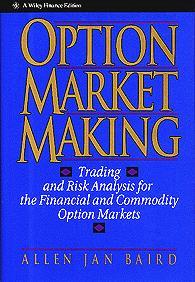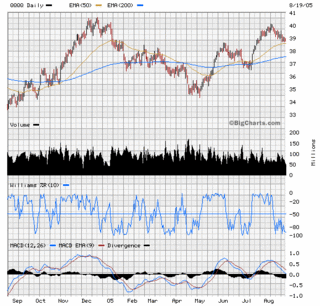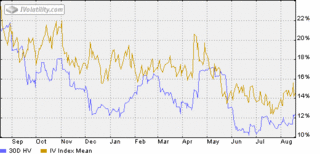Tyler Cowen wonders why futures markets, such as the NYMEX, don't sell longer term bets, and offers up a few possible reasons why.
My take is that these markets develop and grow out of the needs of the hedgers, who look to lay off the risk of future price changes, and focus their efforts on profiting from efficient development, marketing, and production, etc., where they can play a strong hand.
For a market in longer term contracts,like 10 years out, it may not be enough that speculators want them. Speculators can come and go as they please, and their activity alone would probably not provide enough consistent liquidity to sustain the operation.
But firms whose existence requires them to be consistent buyers or sellers of a commodity, like refining and exploration companies are with oil, may have business needs which only require them to lay off price risk a few years out and not beyond.
Without the hedgers participation in the longer term contracts, there is little hope of enough liquidity to justify the contracts existence.
But over-the-counter contracts can be created by the larger brokerage houses, who will take the other side of any bet you care to make--for the right price. If enough of the same kind of OTC bet keeps getting requested, then someone there will eventually get the idea to standardize and list it.
Saturday, August 27
Inflation and Asset Prices
If someone were to ask you what the current rate of inflation is, what would you say? Well, if your answer has anything to do with the CPI (consumer price index) number, you should think again.
Thorstein Polleit writes on the problem with using this index as the benchmark.
Massaging the perceptions of their populations is the oldest game in politics. Are things really as good as they say they are?
The Austrian economists were critical of the use of all indexing, for a number of reasons, and they argued against the use of aggregates that has come to dominate the world of macroeconomics.
The misuse of the (government created) CPI is but one example of how the U.S. government tries to put off the consequences of its own monetary manipulation, at first denying the existence of inflation, and then when no one buys that line anymore, blaming someone else for causing it in the first place.
But being that the nature of all governments is some combination of force and fraud, one could expect no more from them.
The interesting part is how mainstream economists, who have some degree of independence and intelligence, will don their tu-tu's, go before the cameras, and say their lines on cue; denying domestic inflation and blaming price increases on the greedy oil companies or some other villain of the moment.
Misdirection is essential for the scheme to work.
It's how all pickpockets operate.
Thorstein Polleit writes on the problem with using this index as the benchmark.
Massaging the perceptions of their populations is the oldest game in politics. Are things really as good as they say they are?
The Austrian economists were critical of the use of all indexing, for a number of reasons, and they argued against the use of aggregates that has come to dominate the world of macroeconomics.
The misuse of the (government created) CPI is but one example of how the U.S. government tries to put off the consequences of its own monetary manipulation, at first denying the existence of inflation, and then when no one buys that line anymore, blaming someone else for causing it in the first place.
But being that the nature of all governments is some combination of force and fraud, one could expect no more from them.
The interesting part is how mainstream economists, who have some degree of independence and intelligence, will don their tu-tu's, go before the cameras, and say their lines on cue; denying domestic inflation and blaming price increases on the greedy oil companies or some other villain of the moment.
Misdirection is essential for the scheme to work.
It's how all pickpockets operate.
Friday, August 26
Planning For Failure
From cafe Hayek, an MIT professor finds the solution to high oil prices in a scheme to have the best and brightest take over the helm of the American energy market, and force it to conform to their more rational plan for production and consumption.
Dr. Heywood differs from Chinese communists--in that he is not Chinese, and he would most likely balk at the accuracy of the label "communist".
The functions and importance of the system of free prices is a pretty big thing to not know about. And it takes more than a pinch of hubris to be willing to go out in public and unflinchingly display that ignorance. But Dr. Heywood plows ahead, nonetheless.
On second thought, he's perfect for the job.
Dr. Heywood differs from Chinese communists--in that he is not Chinese, and he would most likely balk at the accuracy of the label "communist".
The functions and importance of the system of free prices is a pretty big thing to not know about. And it takes more than a pinch of hubris to be willing to go out in public and unflinchingly display that ignorance. But Dr. Heywood plows ahead, nonetheless.
On second thought, he's perfect for the job.
Saturday, August 20
You Wanna Bet?
Alex Tabarrok from the Marginal Revolution gets a chuckle over environmental "scientists" who are long on talk, short on integrity in Not Putting Their Money Where Their Mouths Are.
Inflation: Deception at the Core
Peter Schiff on Getting to the "Core" of Inflation Propaganda at Kitco.com, argues against this sleight of hand used by establishment economists and media "intellectuals".
These economists say that the already misleading inflation numbers put out by the beneficiaries of said unacknowledged inflation, need to be modified even further, to exclude those price increases which they would like not to be taken account of by ordinary Americans, who know that they, themselves, are paying much higher prices this year, but could be fooled into thinking it's just the result of their own bad luck--and not of the abhorent abuses of the hogs at the trough in our nation's capital.
They might be fooled if morons in suits say these stupid things with straight faces, resonant voices, and the steady stare of their dark, beady eyes which mask the condemned souls of these fallen ones--servants of beelzebub.
At least the people might be fooled for a little while longer. And hey, it's just the next election cycle that really counts anyway, right?
These economists say that the already misleading inflation numbers put out by the beneficiaries of said unacknowledged inflation, need to be modified even further, to exclude those price increases which they would like not to be taken account of by ordinary Americans, who know that they, themselves, are paying much higher prices this year, but could be fooled into thinking it's just the result of their own bad luck--and not of the abhorent abuses of the hogs at the trough in our nation's capital.
They might be fooled if morons in suits say these stupid things with straight faces, resonant voices, and the steady stare of their dark, beady eyes which mask the condemned souls of these fallen ones--servants of beelzebub.
At least the people might be fooled for a little while longer. And hey, it's just the next election cycle that really counts anyway, right?
Option Market Making by Allen Jan Baird

This book is written for those who would like to become a market-maker on one of the options exchange.
Baird's focus is on the "...basic risks, strategies, and tactics of options market-making as a profitable business. It's goal is to be both a theoretical and a practical reference for options traders, dealers, and market-makers in financial and commodity options markets..."
Right off the bat you know that this is not a book for beginners or small-time retail options traders. Nor is it a book for the speculator of any size for that matter, though they too would profit from reading it.
His focus is on those people who have to take the other side of whatever order may come into the options trading pit, and how they might capture their profit while still minimizing their risks.
He starts out with a brief discussion of fair value, pricing models, and volatility. Then he quickly moves on to the standard risks of individual options such as delta, gamma, vega, etc., giving good explanations of each.
Next, he talks about those subjects which don't often appear in thin books on options trading: synthetics, conversions and reversals, the importance of interest rates and boxes, time and calendar risks, and finally core strategies and market-making tactics.
Baird does a great job of avoiding the temptation to impress his readers with a lot of formulas and mathematics and instead relies on simple examples and diagrams to get his concepts across.
As I said, this is a thin volume, coming in at under two hundred pages, but it gets right to the heart of the matter. It doesn't take the encyclopedic approach that some fall back on, but gives simple and direct instructions on how to hedge individual trades and what kinds of overall positions you should be shooting for as a market maker.
This is an excellent addition to any library on options trading, as a reference for the speculator, or an instructional guide for the future market maker.
Options Market Making gets the Full Moon rating; excellent.
Friday, August 19
QQQQs in the short term; bad moon rising.

The Nasdaq, here represented by the qqqq's, looks ready to make a run up to test the yearly high near $41.
But coming at this time of year, in this interest rate environment, and during the first year after a Presidential election, The odds are...that it will fail.
The recent correction during August has been accompanied by the increase in implied volatility that one expects to see when a stock heads south (yellow line). If the Q's do rally from here, implied volatility will again decline offering up a great opportunity to the straddle or put buyer to buy cheap vol going into the traditionaly stormier seas of September.

Front month implied vol on the Q's is currently running about 14 which is not a bad buy in itself, historically, but should it get down to around 10 again within the next few weeks, it would be a screaming buy.
If one wanted to trade this scenario immediately, one could SELL the Put spread Oct 38-39 for about a $.40 credit. Then when the market tests the new highs in the next few weeks buy back the short options (the Oct 39 puts) with the lower implied vol--for about $.30, leaving you long the Oct 38 puts for a net CREDIT of $.10.
Though there aren't any sure things in trading options, getting long vega and gamma that cheaply in this market environment is a solid bet, leaving one open to the small probability of a big payoff.
Subscribe to:
Posts (Atom)